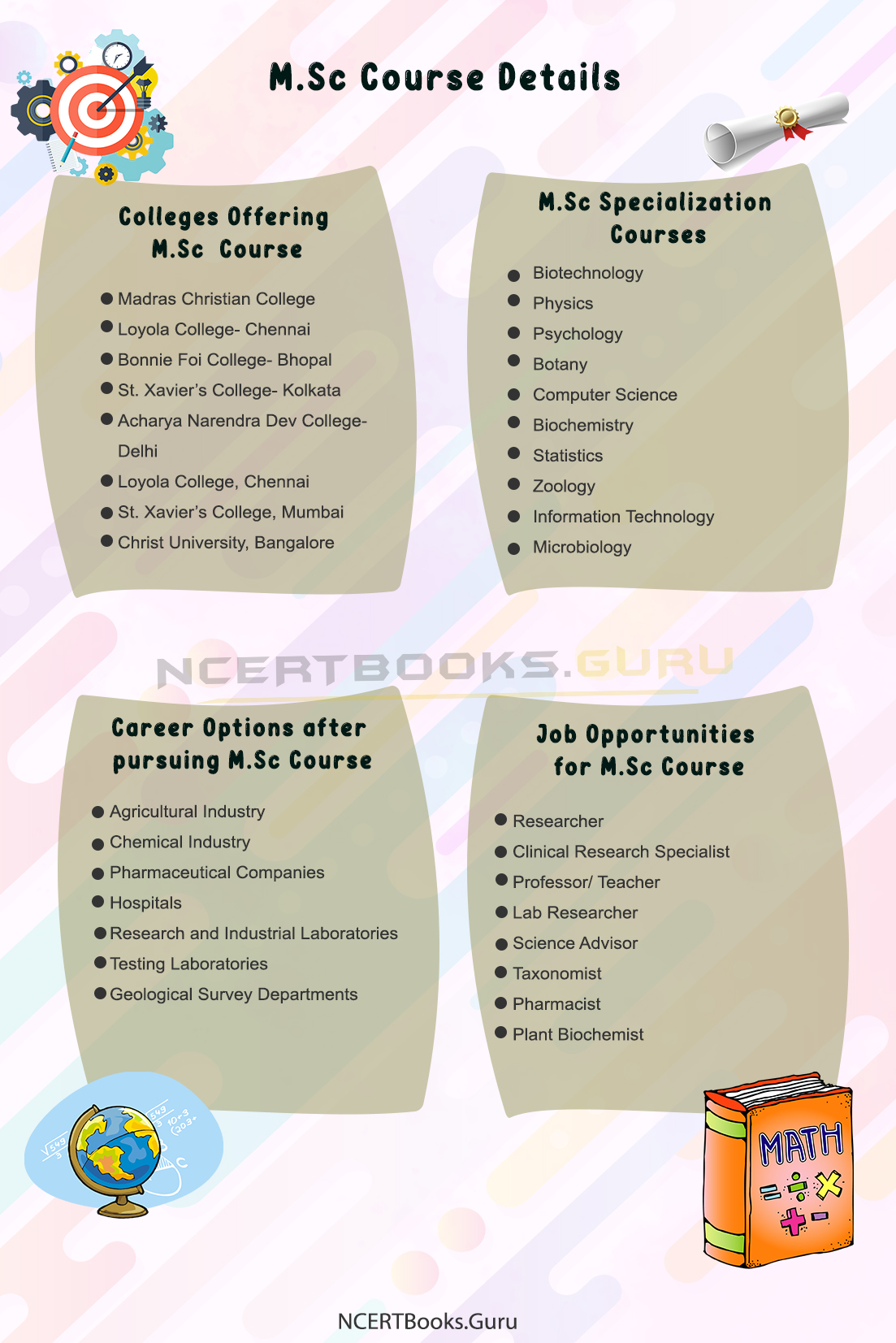M.Sc Course Details: If you want to Pursue or Pursuing your Master of Science Degree you must be searching for queries related to M.Sc. Get to know the info like M.Sc Full Form, Specialization Courses, Required Skillset, Career Prospects. This article clears all your ambiguities like College List, Duration, Fee Structure, Syllabus, Subjects, Salary.
- M.Sc Course Details
- Colleges Offering M.Sc Course
- M.Sc Specialization Courses
- Required Skillset for M.Sc
- Career Options after pursuing M.Sc Course
- Job Opportunities for M.Sc Course
- Master of Science Eligibility Criteria
- M.Sc Admission Process
- Master of Science Course Fee
- M.Sc Course Duration
- M.Sc Entrance Exams
- M.Sc Subjects
- Master of Science Course Syllabus
- M.Sc Course Salary
- What are the courses in Master of Science?
- How long is M.Sc Degree?
- What is the Full Form of M.Sc?
- Is M.Sc Course Good?
- What is the Salary of M.Sc?
What is M.Sc Course?
M.Sc known as Master of Science is a 2 Year Post-Graduate Course. Aspirants will learn technical and crucial aspects regarding the applications of science and industrial work ethics. The Degree provides a scientific, professional or technical entry-level competence. The course will provide both theoretical and practical knowledge to students in the Specialization they chose.
Some of the Popular Specializations include Physics, Chemistry, Biology, Mathematics, Computer Science, Biotechnology, Microbiology, Life Sciences, Statistics, Environmental Sciences, and Food Sciences.
M.Sc Course Details
| Course | M.Sc |
| M.Sc Course Full form | Master of Science |
| Eligibility | (10+2) and Bachelors of Science |
| Duration | 2 years |
| Course Type | Regular mode / Distance mode |
| Starting salary offered | 7.95 Lakhs Per Annum |
| Advance Courses | M.Phil, PhD |
| Similar Course | MCA, MBA |
| Employment Opportunities | Government Sector, financial sector, Actuarial professional, Teacher, Database Manager, and External Auditor |
Colleges Offering M.Sc Course
- Madras Christian College
- Loyola College- Chennai
- Bonnie Foi College- Bhopal
- St. Xavier’s College- Kolkata
- Acharya Narendra Dev College- Delhi
- Loyola College, Chennai
- St. Xavier’s College, Mumbai
- Christ University, Bangalore
- Madras Christian College – [MCC], Chennai
- The Oxford College of Science – [TOCS], Bangalore
- Stella Maris College, Chennai
- Ramjas College, New Delhi
- Fergusson College, Pune
Also, check:
M.Sc Specialization Courses
M.Sc Course List details are along the lines:
- Biotechnology
- Physics
- Psychology
- Botany
- M.Sc Computer Science Course
- Biochemistry
- Statistics
- Zoology
- Information Technology
- Microbiology
- Bioinformatics
- Applied Physics
- Chemistry
- Applied Microbiology
- Mathematics
- Environmental Science
- M.Sc Nursing Course
Required Skillset for M.Sc
| Patience | Determination |
| Attention to detail and accuracy | Analytical skills |
| Scientific skills | Ability to work in a team |
| Observation skills | Research skills |
| Problem-solving skills | – |
Career Options after pursuing M.Sc Course
M.Sc Aspirants can move into various kinds of jobs based on the Specialization they have studied. The course has great scope and opens up a plethora of opportunities both in the Private and Public Sectors.
- Agricultural Industry
- Chemical Industry
- Pharmaceutical Companies
- Hospitals
- Research and Industrial Laboratories
- Testing Laboratories
- Geological Survey Departments
- Colleges/Universities
- Oil Industry
Job Opportunities for M.Sc Course
A Broad Spectrum of Opportunities that exist for Master of Science are enlisted as under
- Researcher
- Clinical Research Specialist
- Professor/ Teacher
- Lab Researcher
- Science Advisor
- Taxonomist
- Pharmacist
- Plant Biochemist

Master of Science Eligibility Criteria
Candidates need to possess a bachelor’s degree in Science from a recognized college or university. Aspirants need to score a minimum percentage of marks in order to be eligible. However, this percentage varies based on university and college.
M.Sc Admission Process
Students should have a Graduate Degree in order to pursue a Master of Science. An Admission Test will be conducted to grant admission to students. Students who clear the Admission Test will only be given admission. Some Colleges or Universities will conduct entrance tests on their own.
Master of Science Course Fee
On an Average Master of Science, Course Fee ranges between 2o,000 – 3 Lakhs Per Annum. M.Sc Fee Structure varies from college to college and also several factors like infrastructure, prestige, and faculty of the college, etc. as well as Management and Government Quotas.
M.Sc Course Duration
Master of Science Course Duration is 2 Years and is distributed in Four Semesters. Each Semester in the M.Sc course lasts for about 6 months and has selected subjects.
M.Sc Entrance Exams
Master of Science will have certain entrance exams to get admissions. Top Entrance exams that enable students to get admission into colleges are prevailing here. They are along the lines
- All India Institute of Medical Sciences [AIIMS] Entrance Exam
- Annamalai University Entrance Exam
- Bharathiyar University M.Sc Entrance Exam
- Banaras Hindu University Entrance Exam
- Bharathidasan University PG Examination
- Calicut University Entrance Exam
- Guru Gobind Singh Indraprastha University Entrance Exam
- Indian Institute of Technology – Joint Admission Test [IIT-JAM]
- Indira Gandhi National Open University Entrance Exam
- Mahatma Gandhi University PG Admission Test
- The Wild Life Institute of India Entrance Exam
- Indian School of Mines Entrance Exam
- Jadavpur University Entrance Exam
- Osmania University Entrance Exam
- University of Pune Entrance Exam
- Tamilnadu Open University [TNOU] Entrance Exam
M.Sc Subjects
Biology
- Genes and Genomics
- Metabolism and Metabolomics
- Proteins and Proteomics
- Recombinant DNA Technology
- Cell Biology
- Methods in Applied Sciences
- Biostatistics and Bioinformatics
- Research Methodology and IPR
Chemistry
- Inorganic Chains, Rings, and Clusters
- Synthetic Strategies and Pericyclic Reactions
- Stereochemistry and Reaction Mechanism
- Thermodynamics and Equilibria
- Group theory and Quantum Chemistry
- Spectroscopic Methods in Chemistry
- Analytical Chemistry
- Solid State Chemistry and Materials Science
- Inorganic Semimicro
- Qualitative Analysis Lab
- Physical Chemistry Experiments Lab
- Inorganic Quantitative Analysis Lab
- Instrumental Methods of Analysis Lab
Physics
- Mathematical Physics
- Mechanics
- Quantum and Statistical Physics
- Electromagnetic Theory
- Mechanics of Deformable Elastic Solids
- Crystal Physics
- Electronics
- Physics of Semiconductor Devices
- Modern Optics
Mathematics
- Real Analysis
- Algebra
- Complex Analysis
- Differential Geometry
- Mechanics
- Topology and Functional Analysis
- Methods of Mathematical Physics
- Numerical Analysis
- Mathematical Statistics
- Computer Applications
- Group Theory
- Rings and Modules
- Number Theory
- Fluid Mechanics
- Special Theory of Relativity
- Analytical Mechanics
- Electromagnetic Theory
- Operations Research
- Theory of Approximation and Splines
- Advanced Functional Analysis
- Solid Mechanics
- Theory of Optimization
Master of Science Course Syllabus
Master of Science for various streams namely Physics, Chemistry, Biology, Mathematics are provided below. Refer to the Master of Course Curriculum followed for various streams to know the subjects in advance. Preparation becomes easy if you have a prior idea on the topics to prepare. Enhance your problem-solving skills and accuracy in the examination with a better grip on the subjects.
The course will focus on specific topics thus developing an in-depth and comprehensive knowledge base. Syllabi provided on this page is similar to the ones followed in major colleges. There can be a slight variation in this and most of it remains the same.
Physics
Master of Science First Year Syllabus
| S. No. | Subjects of Study |
|---|---|
| 1 | Mathematical Physics |
| 2 | Mechanics I (Quantum and Statistical) |
| 3 | Electromagnetic Theory I |
| 4 | Mechanics of Deformable Elastic Solids |
| 5 | Laboratory |
M.Sc Syllabus – Second Year
| S. No. | Subjects of Study |
|---|---|
| 1 | Mechanics II Quantum and Statistical |
| 2 | Electromagnetic Theory II and Crystal Physics |
| 3 | Electronics I |
| 4 | Physics of Semiconductor Devices |
| 5 | Modern Optics |
| 6 | Laboratory |
Chemistry
| Semester 1 | Semester 2 |
|---|---|
| Inorganic Chains, Rings, and Clusters | Synthetic Strategies and Pericyclic Reactions |
| Stereochemistry and Reaction Mechanism | Thermodynamics and Equilibria |
| Group theory and Quantum Chemistry | Spectroscopic Methods in Chemistry |
| Analytical Chemistry | Solid State Chemistry and Materials Science |
| Inorganic Semimicro | Qualitative Analysis Lab |
| Physical Chemistry Experiments Lab | Inorganic Quantitative Analysis Lab |
| Instrumental Methods of Analysis Lab | Elective – I |
| Semester 3 | Semester 4 |
| Bioinorganic and Organometallic Chemistry | Elective – IV |
| Coordination Chemistry | Project |
| Bioorganic, Heterocyclic and Photochemistry | Electives |
| Electrochemistry and Kinetics | Industrial Catalysis |
| Spectroscopic Identification of Molecules | Green Chemistry |
| Organic Qualitative Analysis Lab | Polymer Science |
| Organic Quantitative Analysis Lab | Surface Science and Coating Technology |
| Elective – II | Bioanalytical Chemistry |
| Elective – III | Medicinal Chemistry |
| Chemistry of Biomolecules | Nano-Chemistry and Technology |
Biology
| Semester I | Semester II |
|---|---|
| Genes and Genomics | Metabolism and Metabolomics |
| Proteins and Proteomics | Recombinant DNA Technology |
| Cell Biology | Methods in Applied Sciences |
| Biostatistics and Bioinformatics | Research Methodology and IPR |
| Semester III | Semester IV |
| Research Project | Molecular Oncology and Molecular Medicine |
| – | Clinical Immunology |
| – | Recent Advances in Biology |
| – | Introduction to Pharmacology |
Mathematics
| S. No. | M.Sc Mathematics First Year Syllabus |
|---|---|
| 1 | Complex Analysis |
| 2 | Differential Geometry |
| 3 | Real Analysis |
| 4 | Algebra |
| 5 | Numerical Analysis |
| 6 | Topology and Functional Analysis |
| 7 | Methods of Mathematical Physics |
| 8 | Group Theory |
| 9 | Computer Applications |
| 10 | Mechanics |
| 11 | Mathematical Statistics |
| S. No. | M.Sc Mathematics Second Year Syllabus |
|---|---|
| 1 | Rings and Modules |
| 2 | Number Theory |
| 3 | Analytical Mechanics |
| 4 | Special Theory of Relativity |
| 5 | Fluid Mechanics |
| 6 | Electromagnetic Theory |
| 7 | Solid Mechanics |
| 8 | Theory of Approximation and Splines |
| 9 | Advanced Functional Analysis |
| 10 | Operations Research |
| 11 | Theory of Optimisation |
M.Sc Course Salary
The average Salary that an M.Sc Graduate gets is 7.95 Lakhs Per Annum. However, this varies based on the firm or sector, diligence, experience and skillset gained by the individual.
FAQs on Master of Science
1. What are the courses in Master of Science?
Some of the Popular Specializations in M.Sc include Physics, Chemistry, Mathematics, Biology, Environmental Sciences, Life Sciences, and Food Sciences.
It is a great course that has a wider scope and opens up a plethora of opportunities in various sectors.
5. What is the Salary of M.Sc?
On average M.Sc Graduate will get a starting package of around 7.92 Lakhs Per annum. This can vary from firm to firm, diligence, Skillset, and experience gained in the required field.
Final Words
I Hope, the info prevailing on this page regarding M.Sc Course Details has shed some light on clarifying all your queries. For more info feel free to reach us via the comment section so that we can revert back to you at the earliest. Stay tuned to our site for more info on Books, Study Materials, Notes, and Syllabus.
